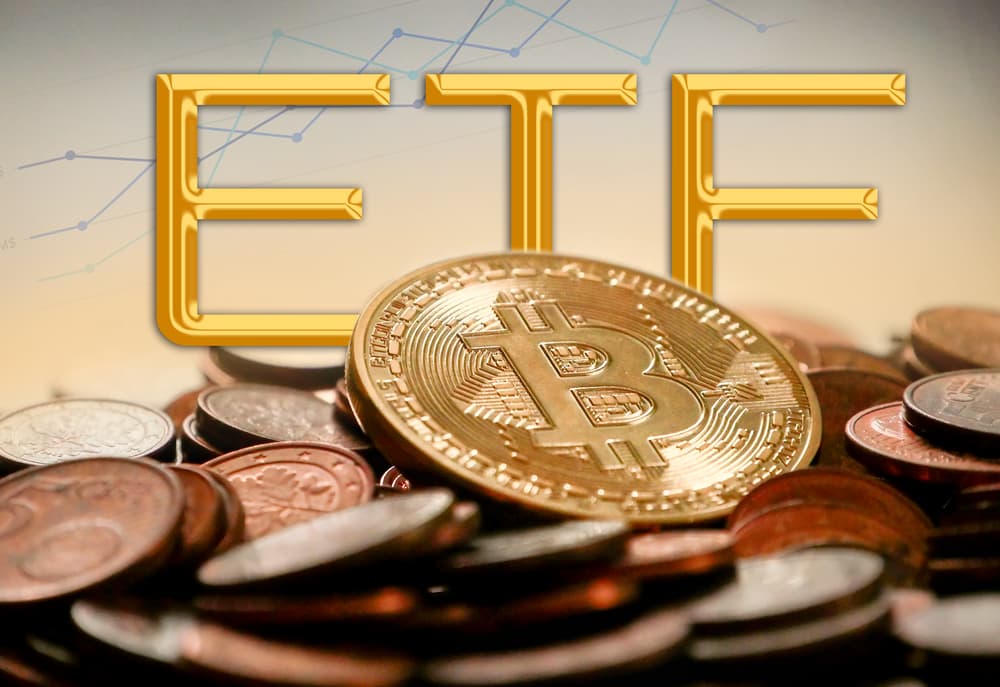
Cryptocurrencies are one of, if not the most, volatile financial assets. This means that this market provides traders with unique opportunities for making large profits, which has seen it attract individual and institutional traders aplenty. However, the downside to the high volatility is that it places these traders at a huge risk of loss. As a hedge to this, crypto ETFs provide traders with a diversified portfolio of crypto assets or stocks of blockchain companies.
How they work
By design, exchange-traded funds (ETFs) invest in a group of stocks, bonds, or any other financial asset. In crypto, the SEC has been reluctant to approve ETFs physically backed by Bitcoin, or any other coin for that matter. However, in October 2021, they approved the first crypto ETF, BITO, which was backed by Bitcoin futures contracts. Since then, several other futures-backed ETFs have received approval from the US-based regulator. Alternatively, some funds invest in stocks of mining companies or any other firms set up to benefit from the adoption of blockchain technology.
Top crypto ETFs
Proshares Bitcoin Strategy ETF (BITO)
This was the first crypto ETF to receive SEC approval. However, as aforementioned, it does not invest in the actual cryptocurrency. Instead, it invests in Bitcoin futures contracts with the shortest time to maturity. As such, the fund may not accurately track BTC spot prices. Further, it incurs additional costs every time the fund manager rolls forward the underlying futures contracts.
These contracts are regulated by the CFTC and are only traded on the Chicago Mercantile Exchange. Other than Bitcoin futures, BITO also invests in US treasury bills. Notably, within a month of its launch, it had managed to amass a total AUM of $1.4 billion.
Amplify Transformational Data Sharing ETF (BLOK)
Launched in 2018, this is an actively managed ETF that tracks stocks of several companies with involvement in blockchain technology. According to its website, the fund aims at investing 80% of its assets in these blockchain-related companies.
As of the time of writing, this fund holds $1.042 billion in assets under management (AUM). Its expense ratio is 0.71%, which means for every $1000 invested in the fund, you’ll be charged expenses to the tune of $7.1. Currently, it holds stocks of 47 different companies; among them are Silvergate Cap, Nvidia, Coinbase Global, and Riot Blockchain Inc.
Bitwise 10 Crypto Index fund (BITW)
Initially, this fund started as a private placement fund. However, it soon opened its doors to the public and is now traded over the counter. It is an actively managed fund that invests in the 10 largest cryptocurrencies. Due to their fluctuation in prices, its portfolio is rebalanced each month.
As of press time, Bitcoin and Ethereum have the largest stakes in this fund’s portfolio, at 60% and 28.6% respectively. The remainder is distributed among Solana, Cardano, Avalanche, Polkadot, Polygon, Cosmos, Litecoin, and ChainLink. BITW charges a 2.5% expense ratio, or $25 for every $1,000 you invest.
Siren Nasdaq NexGen Economy ETF (BLCN)
This is an ETF that invests in companies building and developing blockchain technology. In its portfolio are stocks of 63 of these companies. Its top holdings include Microstrategy, Coinbase Global, Marathon Digital Holdings, American Express, and Visa Inc. Its portfolio also includes shares of renowned banks such as JPMorgan, which are foraying into the crypto industry. The fund holds a total of $197.4 million in assets under management. Investing in this firm would expose you to a diversified selection of blockchain companies, all at an expense ratio of 0.68%.
First Trust Indxx Innovative transaction and Process ETF
This is another ETF that invests in companies that utilize, invest in, develop or have products poised to benefit from blockchain technology. It holds stocks of 102 of these companies, making it one of the most diversified ETFs in the industry. What’s more, First Trust is a renowned investment company, so its track record inspires a lot of investor confidence. Additionally, its expense ratio is only 0.65%, making it one of the lowest maintenance ETFs in this space. Its top holdings include Micron Technology, Moeller Maersk, Nvidia, Mastercard, and Microsoft.
Bitwise Crypto Industry Innovators ETF (BITQ)
Established in May of 2021, this is one of the newest entrants into the crypto ETFs space. It holds 30 stocks of companies building on or utilizing blockchain technology in innovative ways. These companies include Coinbase Global, Silvergate Cap, MicroStrategy, and Riot Blockchain. As of March 31st, it held over $1.2 billion in AUM. However, its expense ratio is a bit high, at 0.85%. By investing in BITQ, you get a traditional ETF granting you exposure to the growing crypto industry, all without the complications of holding the actual coins.
Global X Blockchain ETF (BKCH)
This is another fund investing in companies poised to benefit from blockchain technology. This includes but is not limited to mining companies, companies producing blockchain hardware, and those involved in facilitating digital asset transactions. In total, it holds stocks of 25 of these companies. Major holdings include Riot Blockchain, Coinbase Global, Marathon Digital, Hut 8 Mining Corporation, and Hive Blockchain. Though it is a newly created fund, it is forecasted to grow in value by more than 10 times by 2026. What’s more, its expense ratio is only 0.5%, making it one of the most affordable funds to maintain.
Conclusion
Crypto ETFs offer investors exposure to the crypto industry without them having to hold the actual cryptocurrencies. They achieve this by either investing in futures contracts, tracking crypto indices, or holding stocks of blockchain-related companies. By investing in a single fund, you automatically get a diversified portfolio of these digital assets. Additionally, these funds are usually actively managed, so you do not have to actively track their performance.







